27 feb 2019
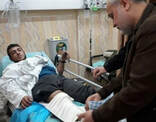
Israeli soldiers shot, Wednesday, a young Palestinian man east of Beit Hanoun, in the northern part of the Gaza Strip.
Media sources said the soldiers opened fire at a Palestinian, in his twenties, and injured him in the leg.
The wounded Palestinian suffered a moderate injury, and was rushed to the Indonesian Hospital, in northern Gaza.
Dozens of Palestinians also protested at night near the perimeter fence, especially east of Jabalia refugee camp, in northern Gaza, and the army fired many high-velocity gas bombs and several rounds of live ammunition.
In related news, Israel Channel 7 has reported that the army was investigating a report about a flammable balloon that “exploded next a house in the Eshkol Regional Council of Settlements, causing damage.”
Media sources said the soldiers opened fire at a Palestinian, in his twenties, and injured him in the leg.
The wounded Palestinian suffered a moderate injury, and was rushed to the Indonesian Hospital, in northern Gaza.
Dozens of Palestinians also protested at night near the perimeter fence, especially east of Jabalia refugee camp, in northern Gaza, and the army fired many high-velocity gas bombs and several rounds of live ammunition.
In related news, Israel Channel 7 has reported that the army was investigating a report about a flammable balloon that “exploded next a house in the Eshkol Regional Council of Settlements, causing damage.”
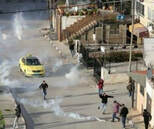
Several children of a kindergarten in the central West Bank city of Ramallah suffered, Thursday, the severe effects of teargas inhalation, after Israeli soldiers invaded the city, and fire gas bombs.
The Palestinian Red Crescent Society (PRCS) said the soldiers invaded Ramallah at-Tihta area, and stormed the homes of Zakariya Zobeidi, a member of the Revolutionary Council of Fateh Movement, and Lawyer Tareq Barghouth, who works with the Palestinian Detainees’ Committee, and abducted them.
The soldiers then fired many gas bombs and concussion grenades at Palestinian protesters in the area, some striking the kindergarten there, causing many children to suffer the effects of teargas inhalation.
The PRCS added that its medics rushed to the kindergarten, and the soldiers tried to stop them, but they insisted on performing their duties and went into the place to provide the children with the needed medical attention.
The Palestinian Red Crescent Society (PRCS) said the soldiers invaded Ramallah at-Tihta area, and stormed the homes of Zakariya Zobeidi, a member of the Revolutionary Council of Fateh Movement, and Lawyer Tareq Barghouth, who works with the Palestinian Detainees’ Committee, and abducted them.
The soldiers then fired many gas bombs and concussion grenades at Palestinian protesters in the area, some striking the kindergarten there, causing many children to suffer the effects of teargas inhalation.
The PRCS added that its medics rushed to the kindergarten, and the soldiers tried to stop them, but they insisted on performing their duties and went into the place to provide the children with the needed medical attention.
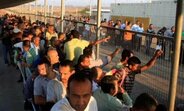
Israeli forces, this morning, attacked hundreds of Palestinian workers who gathered at the narrow corridor of Checkpoint 300, north of the southern West Bank city of Bethlehem, that leads to Jerusalem, causing suffocation, said Palestinian security sources.
Soldiers manning the checkpoint fired tear gas canisters towards the workers after they protested their ill-treatment as they try to pass through the checkpoint, on their way to work in Israel, causing dozens to suffocate from excessive tear gas inhalation.
Soldiers closed the checkpoint following the protest, denying workers access to their workplaces.
According to WAFA, thousands of Palestinian workers who queue before dawn every day to pass through Checkpoint 300 face extreme overcrowding and often wait for hours, in line, due to severe inspection procedures as every person must pass through metal turnstiles one-at-a-time.
Workers crowd into the cement and metal-barred walkway, push through turnstiles, pass a metal detector and show their IDs and permits to Israeli soldiers in order to travel to Israel for work.
Israeli severely restricts Palestinians’ freedom of movement through a complex combination of approximately 100 fixed checkpoints, flying checkpoints, settler-only roads and various other physical obstructions.
Soldiers manning the checkpoint fired tear gas canisters towards the workers after they protested their ill-treatment as they try to pass through the checkpoint, on their way to work in Israel, causing dozens to suffocate from excessive tear gas inhalation.
Soldiers closed the checkpoint following the protest, denying workers access to their workplaces.
According to WAFA, thousands of Palestinian workers who queue before dawn every day to pass through Checkpoint 300 face extreme overcrowding and often wait for hours, in line, due to severe inspection procedures as every person must pass through metal turnstiles one-at-a-time.
Workers crowd into the cement and metal-barred walkway, push through turnstiles, pass a metal detector and show their IDs and permits to Israeli soldiers in order to travel to Israel for work.
Israeli severely restricts Palestinians’ freedom of movement through a complex combination of approximately 100 fixed checkpoints, flying checkpoints, settler-only roads and various other physical obstructions.
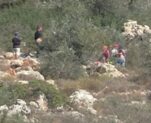
Israeli forces, today, prevented Palestinians from farming their lands in Jaloud village, to the south of Nablus, in the north of the West Bank, said a local official.
Ghassan Daghlas, an official who monitors settlement activities in the northern West Bank, said that Israeli soldiers prevented farmers of Jaloud from cultivating their own lands, located within Area B, which is administered by the Palestinian Authority but under Israeli military security, and adjacent to the illegal Ahiya settlement outpost.
He added, according to WAFA, that Israeli troops have repeatedly prevented Jaloud farmers from accessing this tract of farmland, which occupies tens of dunams.
Israeli forces and settlers from the settlement outposts of Yesh Kodesh and Ahiya, near the Adi Ad settlement, have regularly attacked Palestinians from nearby villages, including Jaloud, targeting their farmlands.
The attacks are intended to make life difficult for Palestinian villagers, to force them to leave and allow settlers to expand their settlements.
Between 500,000 and 600,000 Israelis live in Jewish-only settlements across occupied East Jerusalem and the West Bank in violation of international law.
Ghassan Daghlas, an official who monitors settlement activities in the northern West Bank, said that Israeli soldiers prevented farmers of Jaloud from cultivating their own lands, located within Area B, which is administered by the Palestinian Authority but under Israeli military security, and adjacent to the illegal Ahiya settlement outpost.
He added, according to WAFA, that Israeli troops have repeatedly prevented Jaloud farmers from accessing this tract of farmland, which occupies tens of dunams.
Israeli forces and settlers from the settlement outposts of Yesh Kodesh and Ahiya, near the Adi Ad settlement, have regularly attacked Palestinians from nearby villages, including Jaloud, targeting their farmlands.
The attacks are intended to make life difficult for Palestinian villagers, to force them to leave and allow settlers to expand their settlements.
Between 500,000 and 600,000 Israelis live in Jewish-only settlements across occupied East Jerusalem and the West Bank in violation of international law.
26 feb 2019
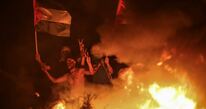
Israeli soldiers injured, on Tuesday evening, four Palestinians and caused many others to suffer the effects of teargas inhalation, east of Gaza city.
Dr. Ashraf al-Qedra, the spokesperson of the Health Ministry of Gaza, said the soldiers shot four Palestinians in Malaka area, east of Gaza city, causing moderate wounds, before the medics rushed them to a local hospital.
He added that several Palestinians suffered the effects of teargas inhalation and received the needed treatment by field medics.
On Monday evening, the soldiers shot three young Palestinian men with live fire, east of Rafah, in the southern part of the Gaza Strip.
On Friday, February 22, the soldiers killed a child, identified as Yousef Sa’id ad-Daya, 14, and injured 41 other Palestinians, including a medic, after resorting to the excessive use of force against the Great Return March processions.
Two Gazan youths injured during Israeli attack on night protests
At least two Palestinian youths were shot and injured on Tuesday evening as Israeli Occupation Forces (IOF) opened their machine-gun fire at dozens of protesters along Gaza eastern borders.
Locals told PIC reporter that Israeli forces fired live ammunition and teargas bombs at Palestinians demonstrating peacefully to the east of the Gaza Strip, injuring two of them.
Dozens of young men torched tires, used loudspeakers to play national songs and sirens, and flashed laser beams at soldiers behind the border fences.
Organizers say the night rallies are aimed at creating confusion among Israeli forces behind the border fences.
The night protests are part of a resurgence in border demonstrations following a brief lull after Egypt, Qatar and UN officials have failed to broker a long-term truce between Hamas and Israel.
Dr. Ashraf al-Qedra, the spokesperson of the Health Ministry of Gaza, said the soldiers shot four Palestinians in Malaka area, east of Gaza city, causing moderate wounds, before the medics rushed them to a local hospital.
He added that several Palestinians suffered the effects of teargas inhalation and received the needed treatment by field medics.
On Monday evening, the soldiers shot three young Palestinian men with live fire, east of Rafah, in the southern part of the Gaza Strip.
On Friday, February 22, the soldiers killed a child, identified as Yousef Sa’id ad-Daya, 14, and injured 41 other Palestinians, including a medic, after resorting to the excessive use of force against the Great Return March processions.
Two Gazan youths injured during Israeli attack on night protests
At least two Palestinian youths were shot and injured on Tuesday evening as Israeli Occupation Forces (IOF) opened their machine-gun fire at dozens of protesters along Gaza eastern borders.
Locals told PIC reporter that Israeli forces fired live ammunition and teargas bombs at Palestinians demonstrating peacefully to the east of the Gaza Strip, injuring two of them.
Dozens of young men torched tires, used loudspeakers to play national songs and sirens, and flashed laser beams at soldiers behind the border fences.
Organizers say the night rallies are aimed at creating confusion among Israeli forces behind the border fences.
The night protests are part of a resurgence in border demonstrations following a brief lull after Egypt, Qatar and UN officials have failed to broker a long-term truce between Hamas and Israel.
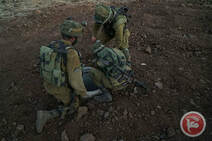
Israeli forces carried out military training in Palestinian agricultural lands in the al-Taybeh and Anin villages west of the northern occupied West Bank city of Jenin, late Monday.
Head of the al-Taybeh village council, Khalid Jabbarin, said that Israeli soldiers arrived into a football field in the al-Taybeh village via an Israeli military helicopter, before carrying out military training inside nearby agricultural lands.
Similar training was also carried out in the al-Jalama camp.
Head of the al-Taybeh village council, Khalid Jabbarin, said that Israeli soldiers arrived into a football field in the al-Taybeh village via an Israeli military helicopter, before carrying out military training inside nearby agricultural lands.
Similar training was also carried out in the al-Jalama camp.
|
|
Dozens of Palestinian workers suffered tear-gas suffocation while at Checkpoint 300, north of the southern occupied West Bank city of Bethlehem, as Israeli forces fired tear-gas canisters at hundreds of workers waiting at the checkpoint on Tuesday morning.
Palestinian security sources said that Israeli forces fired tear-gas canisters towards workers after protesting Israeli soldiers' ill-treatment of them. Israeli forces then sealed off the checkpoint, denying workers access to their workplaces inside Israel. Under Israel’s permit regime, Palestinian residents of the West Bank are not allowed to access occupied East Jerusalem or Israel without an Israeli-issued permit, and many risk being shot and injured while trying to cross into Israel to work. Tens of thousands of Palestinian workers are forced to seek a living by working in Israel due to crippling unemployment in the West Bank, as the growth of an independent Palestinian economy has been stifled under the ongoing Israeli military occupation, according to rights groups. Workers who hold Israeli entry permits, however, must endure long waits at the Checkpoint 300, one of the only access points Palestinians from the southern West Bank have to Jerusalem and Israel. Checkpoint 300 was built in 2005 two kilometers inside of the green line, despite rulings by the International Court of Justice that the separation wall was deemed illegal in 2004. High numbers of Palestinians, especially construction laborers, cross through the checkpoint every day, facing frequent overcrowding and often waiting for hours in line due to Israeli security measures. |
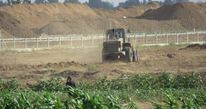
The Israeli occupation army on Tuesday morning launched a limited military incursion into Beit Hanoun town in the northern Gaza Strip.
Several Israeli military bulldozers rolled a few hundred meters into Palestinian farmlands east of Beit Hanoun, local sources said.
Meanwhile, the Israeli forces fired tear gas bombs at Palestinian farmers working in their lands east of Khan Younis city in the southern Gaza Strip.
The Israeli army on almost a daily basis carry out military incursions into blockaded Gaza and raze Palestinian farmlands in violation of the Egypt-sponsored ceasefire agreement signed by Israel and Palestinian resistance groups in 2014.
Several Israeli military bulldozers rolled a few hundred meters into Palestinian farmlands east of Beit Hanoun, local sources said.
Meanwhile, the Israeli forces fired tear gas bombs at Palestinian farmers working in their lands east of Khan Younis city in the southern Gaza Strip.
The Israeli army on almost a daily basis carry out military incursions into blockaded Gaza and raze Palestinian farmlands in violation of the Egypt-sponsored ceasefire agreement signed by Israel and Palestinian resistance groups in 2014.
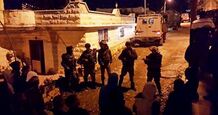
The Israeli occupation forces (IOF) on Monday evening threatened to take punitive measures against the residents of Hizma town, northeast of Jerusalem, on allegations that local youths continued to throw stones at settlers’ cars.
According to local sources, the IOF stormed the town, fired stun grenades and intercepted cars and passersby.
Israeli soldiers also circulated notices containing threats to take punitive measures against the residents if stone-throwing attacks on Israeli cars did not stop.
Later, the IOF closed the main entrance to the town and prevented Palestinian cars and citizens from leaving or entering through it.
According to local sources, the IOF stormed the town, fired stun grenades and intercepted cars and passersby.
Israeli soldiers also circulated notices containing threats to take punitive measures against the residents if stone-throwing attacks on Israeli cars did not stop.
Later, the IOF closed the main entrance to the town and prevented Palestinian cars and citizens from leaving or entering through it.
25 feb 2019

Three Palestinians were shot and injured on Monday evening as Israeli forces attacked night confrontations in different border areas of the besieged Gaza Strip.
Palestinian Health ministry affirmed that three protesters suffered different injuries during the attack.
A PIC reporter in Gaza said that dozens of young men torched tires, used loudspeakers to play national songs and sirens, and flashed laser beams at soldiers behind the border fences.
Organizers say the night rallies are aimed at creating confusion among Israeli forces behind the border fences.
The night protests are part of a resurgence in border demonstrations following a brief lull after Egypt, Qatar and UN officials have failed to broker a long-term truce between Hamas and Israel.
Palestinian Health ministry affirmed that three protesters suffered different injuries during the attack.
A PIC reporter in Gaza said that dozens of young men torched tires, used loudspeakers to play national songs and sirens, and flashed laser beams at soldiers behind the border fences.
Organizers say the night rallies are aimed at creating confusion among Israeli forces behind the border fences.
The night protests are part of a resurgence in border demonstrations following a brief lull after Egypt, Qatar and UN officials have failed to broker a long-term truce between Hamas and Israel.
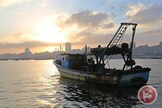
Israeli naval forces opened heavy fire, on Monday, towards Palestinian fishing boats off the coast of Beit Lahiya, in the northern besieged Gaza Strip.
A Ma'an reporter said that Israeli naval forces opened fire at Palestinians fishing boats within the permitted fishing zone, forcing the fishermen to head back to shore in fear for their lives.
No injuries were reported.
According to the United Nations Office for Humanitarian Affairs (OCHA), Israel’s blockade of the coastal enclave has seriously undermined the ability for Gazan fishermen to make a living at sea.
The Israeli army regularly detains and opens fire on unarmed Palestinian fishermen, shepherds, and farmers along the border areas if they approach the unilaterally declared buffer zone.
Israeli human rights group B'Tselem recently concluded that Israel's Gaza closure and "harassment of fishermen" have been "destroying Gaza's fishing sector," with 95% of fishermen living below the poverty line.
Additionally, Local rights organization, Al-Haq, has documented many cases of Israeli aggression toward Palestinian fishermen off the Gazan coast, calling the Israel's action against the fishermen "collective punishment" that imposes "difficult economic and social conditions."
A Ma'an reporter said that Israeli naval forces opened fire at Palestinians fishing boats within the permitted fishing zone, forcing the fishermen to head back to shore in fear for their lives.
No injuries were reported.
According to the United Nations Office for Humanitarian Affairs (OCHA), Israel’s blockade of the coastal enclave has seriously undermined the ability for Gazan fishermen to make a living at sea.
The Israeli army regularly detains and opens fire on unarmed Palestinian fishermen, shepherds, and farmers along the border areas if they approach the unilaterally declared buffer zone.
Israeli human rights group B'Tselem recently concluded that Israel's Gaza closure and "harassment of fishermen" have been "destroying Gaza's fishing sector," with 95% of fishermen living below the poverty line.
Additionally, Local rights organization, Al-Haq, has documented many cases of Israeli aggression toward Palestinian fishermen off the Gazan coast, calling the Israel's action against the fishermen "collective punishment" that imposes "difficult economic and social conditions."
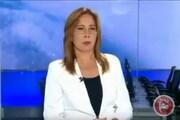
An Israeli news anchor who has blamed the Israeli occupation of Palestinian lands for turning regime troops into “animals” has defended her comments despite having received death threats from “thousands.”
Israeli Channel 13 TV anchor Oshrat Kotler had, last week, denounced the mistreatment of Palestinians in Israeli custody, following a piece aired on the channel about five Israeli soldiers indicted for beating two handcuffed and blindfolded Palestinians — a father and his 15-year-old son. video
According to the indictment, the father was hospitalized for three days after sustaining multiple broken ribs, a “severely” broken nose, and subdermal bleeding around his stomach. The son also suffered a number of wounds to his head and “significant swelling” on his face.
After the report was aired, Kotler said, “We send children to the army, to the [occupied] territories, and get back animals. That is the result of the occupation.”
On Saturday, however, Kotler said she stood by her comments despite having been flooded with death threats, according to The Times of Israel.
She accused Israeli politicians of taking “cynical” advantage of her comments and taking them out of context in the midst of an election campaign.
“I am sorry if I hurt anyone with my words, but I cannot see the price we pay through our children for the reality of controlling another nation,” she said, appearing to fight back tears and referring to Palestinians. “We have lived this reality for 52 years. I do not have a magic solution; I am not a politician.”
‘Thousands of death threats’
She said her comments, “spoken with great pain,” had been “directed only at the soldiers who violated the law” and not all Israeli troopers.
“Thousands threatened my life and the life of my family, and I am afraid, but I hope to find the strength to continue and express my opinion as a reporter,” she said.
Israeli NGO Peace Now backed Kotler, saying, “It is permissible and even desirable to look into the mirror from time to time and honestly admit to the damage [caused by] the occupation. Those whose children’s futures are important to them should work to end the conflict rather than maintain it, because the price is high.”
Tamar Zandberg, the leader of left-wing Meretz Party, called the attacks on Kotler “pathetic and yet predictable… shutting your eyes [to the problem] and then assailing the messenger is not a solution.”
Israeli forces have on numerous occasions been caught on camera brutally beating or killing Palestinians, with the videos going viral online and sparking widespread condemnations, Press TV/Al Ray reports.
Israeli Channel 13 TV anchor Oshrat Kotler had, last week, denounced the mistreatment of Palestinians in Israeli custody, following a piece aired on the channel about five Israeli soldiers indicted for beating two handcuffed and blindfolded Palestinians — a father and his 15-year-old son. video
According to the indictment, the father was hospitalized for three days after sustaining multiple broken ribs, a “severely” broken nose, and subdermal bleeding around his stomach. The son also suffered a number of wounds to his head and “significant swelling” on his face.
After the report was aired, Kotler said, “We send children to the army, to the [occupied] territories, and get back animals. That is the result of the occupation.”
On Saturday, however, Kotler said she stood by her comments despite having been flooded with death threats, according to The Times of Israel.
She accused Israeli politicians of taking “cynical” advantage of her comments and taking them out of context in the midst of an election campaign.
“I am sorry if I hurt anyone with my words, but I cannot see the price we pay through our children for the reality of controlling another nation,” she said, appearing to fight back tears and referring to Palestinians. “We have lived this reality for 52 years. I do not have a magic solution; I am not a politician.”
‘Thousands of death threats’
She said her comments, “spoken with great pain,” had been “directed only at the soldiers who violated the law” and not all Israeli troopers.
“Thousands threatened my life and the life of my family, and I am afraid, but I hope to find the strength to continue and express my opinion as a reporter,” she said.
Israeli NGO Peace Now backed Kotler, saying, “It is permissible and even desirable to look into the mirror from time to time and honestly admit to the damage [caused by] the occupation. Those whose children’s futures are important to them should work to end the conflict rather than maintain it, because the price is high.”
Tamar Zandberg, the leader of left-wing Meretz Party, called the attacks on Kotler “pathetic and yet predictable… shutting your eyes [to the problem] and then assailing the messenger is not a solution.”
Israeli forces have on numerous occasions been caught on camera brutally beating or killing Palestinians, with the videos going viral online and sparking widespread condemnations, Press TV/Al Ray reports.
24 feb 2019
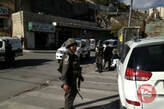
A Palestinian teacher was shot and injured by Israeli forces, on Saturday, during raids of the Issawiya neighborhood in occupied East Jerusalem.
Muhammad Abu al-Hummus, member of a local follow-up committee, said that Israeli forces raided the neighborhood as Palestinian students and teachers made their way back home from school.
Abu al-Hummus stressed that one teacher was shot and injured in her hand after Israeli forces repeatedly fired rubber-coated steel bullets and stun grenades across Issawiya.
The teacher was transferred to a hospital for medical treatment. Her medical condition remained unknown.
Muhammad Abu al-Hummus, member of a local follow-up committee, said that Israeli forces raided the neighborhood as Palestinian students and teachers made their way back home from school.
Abu al-Hummus stressed that one teacher was shot and injured in her hand after Israeli forces repeatedly fired rubber-coated steel bullets and stun grenades across Issawiya.
The teacher was transferred to a hospital for medical treatment. Her medical condition remained unknown.
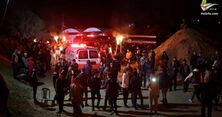
Five Palestinian citizens suffered injuries on Saturday night during renewed night confrontations with Israeli soldiers in different border areas of the besieged Gaza Strip.
Medical sources told the Palestinian Information Center (PIC) that five citizens were injured after Israeli soldiers showered them with a hail of tear gas grenades and opened fire indiscriminately at them as they were rallying at night in border areas east of Khuza’a (south of Gaza) and al-Bureij refugee camp (central Gaza).
A PIC reporter in Gaza said that dozens of young men torched tires, used loudspeakers to play national songs and sirens, and flashed laser beams at soldiers behind the border fences.
Organizers say the night rallies are aimed at creating confusion among Israeli forces behind the border fences.
The night protests are part of a resurgence in border demonstrations following a brief lull after Egypt, Qatar and UN officials have failed to broker a long-term truce between Hamas and Israel.
Medical sources told the Palestinian Information Center (PIC) that five citizens were injured after Israeli soldiers showered them with a hail of tear gas grenades and opened fire indiscriminately at them as they were rallying at night in border areas east of Khuza’a (south of Gaza) and al-Bureij refugee camp (central Gaza).
A PIC reporter in Gaza said that dozens of young men torched tires, used loudspeakers to play national songs and sirens, and flashed laser beams at soldiers behind the border fences.
Organizers say the night rallies are aimed at creating confusion among Israeli forces behind the border fences.
The night protests are part of a resurgence in border demonstrations following a brief lull after Egypt, Qatar and UN officials have failed to broker a long-term truce between Hamas and Israel.
